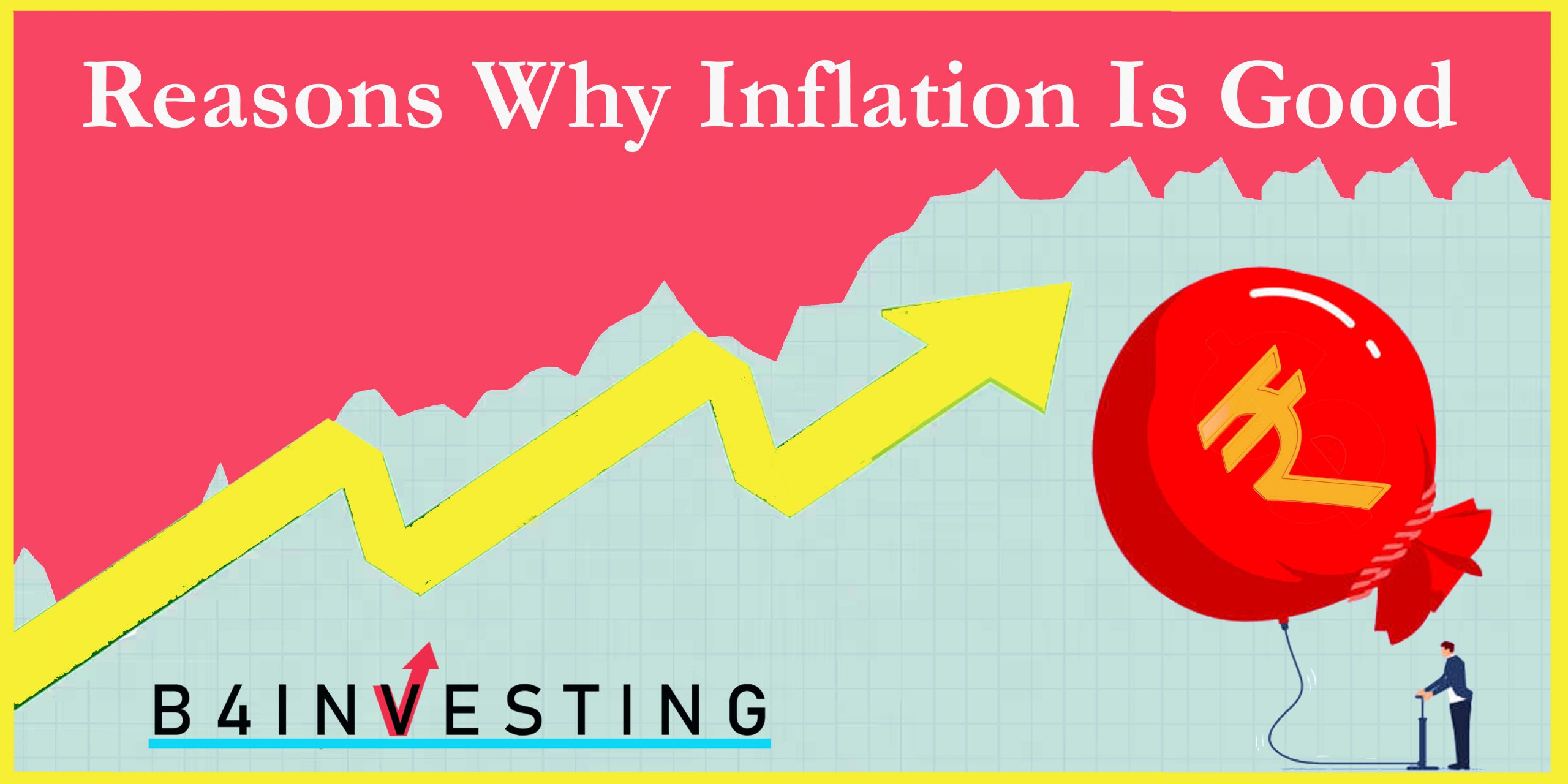
Reasons Why Inflation Is Good
Inflation means the rise in the prices of goods and services of daily or common use, such as food, clothing, housing, recreation, transport, consumer staples, etc. If we bought a bag of goods and services at Rs1000 last year and today it is costing Rs1040 then we say inflation is 4% this year. In short, inflation means change in prices of goods and services.
Usually, inflation is a broad measurement which shows the rise in overall prices or increase in the cost of living for a given period. But it can also be calculated for individual commodities and services. Inflation is good when the percentage is not high. While it can have adverse effects on some individuals, there are also beneficiaries of inflation. Lets understand when inflation is good with two situations:
- Inflation makes consumer expect prices to rise continuously. So consumers want to buy things now as they will have to pay more due to inflation. This increases demand in short term so store sells more and factories produces more and hire more people. It boosts economic growth.
- Moderate inflation removes the risk of deflation. Deflation means drop is prices of goods and services. In this situation, consumers wait to check if prices drops more before buying. It results in decrease in demand. So, businesses also reduce their inventory and factories produces less number of products. It affects the wages of people and it also creates unemployment. People have less money to spend due to decrement in wages and it reduces demand more. So, deflation is more harmful than inflation.
Who Benefits From Inflation
Inflation is a complex economic phenomenon which affects different groups of people in different ways. Here are a few groups that may benefit from inflation:
- Borrowers: Inflation can deteriorate the real value of debt over time. If you borrow money and inflation increases, the value of the debt you owe will be reduced in real terms. This is particularly beneficial for borrowers with fixed-rate loans because they can repay the debt with less valuable currency. For example, if you have taken load of Rs10,00,000 and if inflation rises then your debt has less worth as time progresses.
- Debtors: Similar to borrowers, individuals who have existing debt can benefit from inflation. As the general price level rises, the nominal value of their assets and income may increase. This means they can repay their debt with less effort and retain more purchasing power.
- Asset owners: Inflation can positively impact the value of certain assets, such as real estate, stocks, and commodities. When prices rise, the nominal value of these assets tends to increase. As a result, asset owners can see their wealth grow in real terms. However, it’s important to note that the relationship between inflation and asset values can be complex and dependent on various factors.
- Government: Inflation can provide benefits to governments, especially if they have outstanding debt. As the value of money declines, the government‘s debt burden can be reduced in real terms, making it easier to repay. Additionally, governments often have the ability to increase tax revenues as incomes and prices rise, which can help offset the negative effects of inflation.
When Inflation Is Bad
Inflation can be considered bad under certain circumstances. Here are some situations where inflation can have negative consequences:
- High and Uncontrolled Inflation: When inflation rates are excessively high and not effectively managed, it can erode the value of money rapidly. This makes it difficult for individuals and businesses to plan for the future, as the purchasing power of money diminishes rapidly. It can lead to economic instability, uncertainty, and a decline in living standards.
- Cost of Living Increases: Inflation can cause the general cost of living to rise, making goods and services more expensive. This can particularly impact individuals and families with fixed incomes or limited financial resources, as they may struggle to afford basic necessities. High inflation can reduce the standard of living, especially for low-income households.
- Reduced Savings and Investments: Inflation can erode the value of savings and investments. If the rate of inflation exceeds the rate of return on savings or investments, people can effectively lose money in real terms. This can discourage saving and investing, leading to lower capital accumulation and long-term economic growth.
- Uncertainty and Market Volatility: High inflation can create uncertainty in financial markets. Investors may become cautious or hesitant to make long-term investments or commitments due to the unpredictable effects of inflation. This can lead to increased market volatility and reduced business investment, which can negatively impact economic growth.
- International Competitiveness: If a country experiences higher inflation compared to its trading partners, its goods and services may become relatively more expensive in international markets. This can make exports less competitive and imports more attractive, potentially resulting in a negative impact on trade balance and economic growth.
- Distorted Price Signals: Inflation can distort price signals in the economy, making it harder for individuals and businesses to make informed decisions. When prices are rapidly changing due to inflationary pressures, it becomes difficult to differentiate between changes in relative prices and changes in the general price level. This can lead to misallocation of resources and inefficiencies in the economy.
- Negative Effects on Fixed-Income Groups: Inflation can be particularly challenging for fixed-income groups such as retirees or pensioners who rely on a fixed income stream. As prices rise, their purchasing power diminishes, potentially resulting in financial hardships and reduced living standards.
Read also: Strength of Currency
Takeaway:
It’s important to note that moderate and controlled inflation can be beneficial for an economy, as it encourages spending, investment, and economic growth. Central banks often aim to maintain a low and stable inflation rate to balance these factors. The detrimental effects of inflation are more pronounced in cases of high and uncontrolled inflation.

